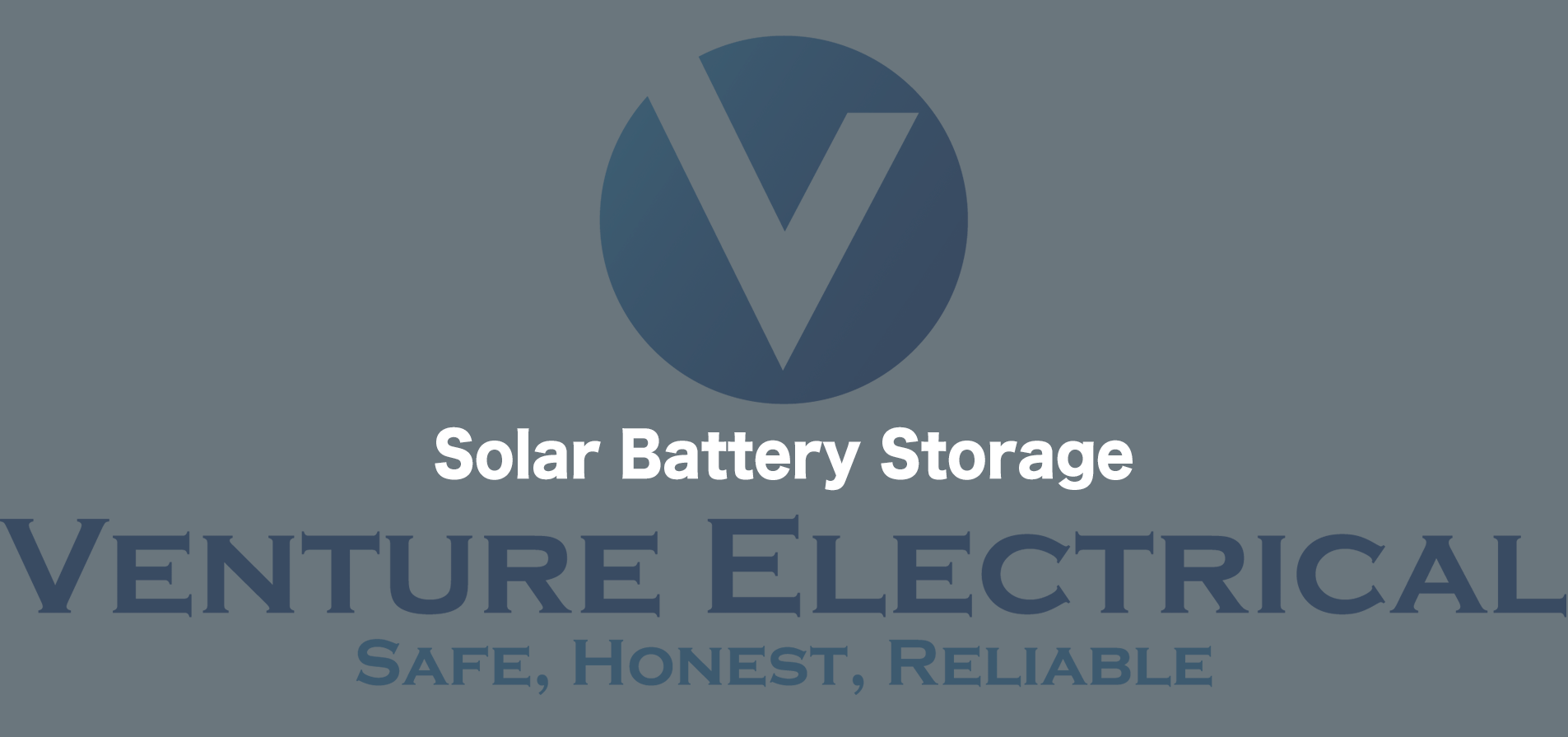Benefits Of Solar Battery Storage
We highly recommend considering a battery storage solution for your home or business. A battery storage system allows you to store excess energy generated by your solar PV system during the day, so you can use it later when the sun isn't shining.
However you can still install a battery solution without the need for Solar PV, making use of cheaper off-peak energy tariffs to charge the batteries and then use the cheaper stored energy during peak times.This means you can reduce your reliance on the grid and lower your energy bills even further.
Plus, during power outages, you can continue to use your stored energy, providing you with greater energy independence and security.
At Venture Electrical Ltd, we offer a range of battery storage solutions that can be customised to meet your specific needs, so you can start enjoying the benefits of renewable energy and energy storage today.
Top 5 reasons to get battery storage
- Increased Energy Independence: With a battery storage system, you can store the excess energy generated by your solar PV system and use it when you need it, reducing your reliance on the grid and increasing your energy independence.
- Lower Energy Bills: By storing and using your own solar energy, you can reduce your reliance on the grid and lower your energy bills even further, maximising your savings.
- Backup Power: In the event of a power outage, a battery storage system can provide you with backup power, so you can continue to power your home or business even when the grid is down.
- Environmental Benefits: By storing and using your own solar energy, you are reducing your carbon footprint and contributing to a cleaner environment.
- Increase the Value of Your Home: A home with a battery storage system can increase the value of your property, as it's seen as a desirable feature for potential buyers.
Contact us
Where can we install Battery Storage solutions?
- Domestic premises (inside or outside)
- Commercial premises (inside or outside)
- Industrial premises (inside or outside)
Reliable Solar Batteries
Solar batteries also provide a reliable source of backup power in case of power outages due to storms or other emergencies. By having a dedicated source of stored energy available, homeowners don’t have to worry about relying solely on the grid for their power needs in times of need. Solar batteries can also help increase renewable energy usage by allowing homeowners to store excess renewable energy generated during peak production periods for use later when it’s needed most. Finally, solar batteries can play an important role in helping improve grid stability by providing short-term or peak loads with stored energy instead of taking additional strain off existing infrastructure resources.
In short, solar battery storage offers numerous benefits that make it an attractive option for homeowners looking to reduce their electric bills while simultaneously increasing their reliance on renewable sources of energy and improving grid stability.
Types Of Solar Battery Storage
Moving on from the definition of solar battery storage, there are several types of solar battery storage available. The most popular type is lithium-ion batteries. These batteries store energy in a chemical form and can be used to power homes, businesses and other facilities. They are also lightweight and easy to install, making them an attractive choice for many people.
Another type of solar battery storage is lead acid batteries. These batteries have a longer lifespan than lithium-ion batteries and are capable of storing more energy. Lead acid batteries are often used in large industrial or commercial applications since they can store higher amounts of electricity for long periods of time.
The third type is flow batteries which store energy in a liquid form rather than a solid state. This makes them ideal for long duration use since they can be charged quickly and hold their charge over extended periods without degrading or losing capacity. Flow batteries are typically seen in large scale applications such as utility companies or in remote locations where grid access is limited or nonexistent.
Solar battery storage has come a long way over the past few decades and continues to improve with advances in technology, making it easier and more affordable for people to take advantage of the benefits it offers. With its ability to reduce electricity costs, increase reliability, and provide backup power during outages, it's no wonder why so many people are turning to solar battery storage solutions as part of their energy strategy.
Cost Savings
The use of solar battery storage can lead to considerable cost savings in the long term. For example, homeowners can store excess energy produced during the day and then draw on it during peak demand periods when electricity costs are higher. This means that instead of paying for expensive power from the grid at peak times, they can access their own stored energy instead. Additionally, those who have purchased a solar panel system can take advantage of net metering, which allows them to earn credits for any excess energy they produce and store. This essentially means that their energy bills will be lower than what they would be without a solar battery storage system in place.
Furthermore, having a solar battery storage system in place also helps guard against blackouts and power outages. In areas where this is an issue, having an independent source of power like this can provide protection against unexpected outages. This is especially beneficial for businesses who depend on continuous power supply to keep operations running smoothly.
Overall, investing in a solar battery storage system can provide many advantages both financially and practically speaking. It has the potential to reduce electricity bills while providing protection against outages and other disruptions at the same time.
Environmental Advantages
In addition to the cost savings, solar battery storage has a range of environmental advantages. The most significant advantage is that it helps reduce greenhouse gas emissions. Solar energy does not produce any emissions, and when used in combination with battery storage, it can reduce the need for polluting sources of energy such as coal or natural gas. This can significantly reduce air pollution and help combat climate change.
Another benefit of solar battery storage is that it can help increase grid reliability and reduce outages. Battery storage systems provide backup power if the grid fails, which means that even during prolonged outages, homes and businesses can still have access to electricity. This helps ensure that essential services are not interrupted due to power failures and also helps minimize disruptions to daily life.
Finally, solar battery storage systems require little to no maintenance after they are installed, making them a reliable option for long-term energy production. With no moving parts required and minimal upkeep needed, these systems can provide clean energy for many years without needing repairs or replacements. This makes them an ideal choice for those who want reliable access to renewable energy without having to worry about frequent maintenance costs.
Improved Grid Reliability
Improved grid reliability is one of the greatest benefits of solar battery storage. As more and more people transition to renewables, the need for energy storage solutions increases. Solar battery storage helps to increase the reliability of the grid by providing a backup power source during periods of high demand or outages. This reduces stress on the grid and helps to ensure that electricity is available when needed.
Solar battery storage can also provide electricity during peak hours when energy prices are highest, allowing users to save money on their energy bills. During peak hours, when there is higher demand for electricity, solar batteries can be used to store excess energy until it's needed again. This helps to reduce strain on the grid and keeps energy costs down for consumers.
Solar battery storage also has environmental benefits as it helps to reduce emissions from traditional sources of power generation such as coal and gas plants. By using renewable energy sources and storing excess energy in batteries, consumers can help reduce their carbon footprint and contribute to a cleaner environment.
Solar battery storage provides many advantages that make it a great choice for homeowners looking for reliable power as well as those looking to save money on their utility bills and reduce their environmental impact.
Backup Power Option
One of the biggest benefits of solar battery storage is having a reliable backup power option. This can provide you with peace of mind during emergency situations or instances where the grid is down due to inclement weather or other issues. During these times, your solar battery can act as a generator and provide electricity to the home without relying on traditional sources. Not only does this give you more independence, but it also offers significant financial savings over the long term.
Another benefit of solar battery storage is that it provides an opportunity to store excess energy produced by your solar panels for later use. This can be especially beneficial during times when your panels are producing more than enough energy to power your home and appliances. By storing this excess energy in batteries, you'll be able to save money on your monthly electric bill and make sure that you always have access to electricity when you need it.
Finally, solar batteries are also excellent for reducing your dependence on the grid and improving overall energy efficiency in your home. By taking advantage of stored energy from batteries instead of traditional sources, you'll be able to reduce your energy consumption and help protect our planet's future.
Increase In Home Value
One of the greatest benefits of solar battery storage is the increase in home value. Investing in solar energy not only reduces your monthly electricity costs, but it can also add thousands to your home's resale value. In fact, installing a residential solar system has been known to result in a 5-20% increase in property value. This can be an especially lucrative option for those looking to sell their homes in the near future.
Moreover, homes with solar energy systems are more attractive to potential buyers than those that don't have them. This is because they provide an energy-savings benefit that will last for years. Solar battery storage systems are becoming increasingly popular and many buyers prefer having an energy-efficient home that requires little maintenance.
Additionally, when you purchase a residential solar system you may be eligible for various tax credits or rebates depending on where you live. These incentives can help offset the initial cost of installation and maximize your return on investment. With all these benefits combined, investing in solar battery storage could be one of the best decisions you make for your home and pocketbook!
Tax Credits And Incentives
Tax credits and incentives can be an effective way to reduce taxes and encourage certain activities. They can be used to help businesses expand or invest in new equipment, hire new employees, or develop new products. They can also be used to encourage individuals to save for retirement or purchase a home. Tax credits and incentives are an important part of a country's economic policy and can be used to promote economic growth.
One of the biggest benefits of solar battery storage is the ability to take advantage of tax credits and incentives. Federal and state governments offer a variety of credits and incentives for those who install solar batteries. In addition, many utility companies offer additional incentives for customers who install energy-efficient systems.
The federal government's Solar Investment Tax Credit (ITC) is one of the best programs available. This program offers up to 30% back on the cost of installing a solar energy system, including batteries. Many states also offer their own tax credits or rebates for residents who install solar energy systems.
Incentives can vary from year to year and state to state, so it's important to research the available options in your area before deciding which system is right for you. To maximize savings, look into all potential sources of credit and incentive programs that could be applicable to your project. With all these savings opportunities, there's no reason why anyone should miss out on taking advantage of this great opportunity!
Installation Requirements
Installing solar battery storage is a great way to ensure sustainable energy sources. Before beginning the installation process, there are some requirements that must be met.
First, it is important to make sure the roof has the proper structure and safety components for the system. This includes ensuring that all roof supports are in good condition and that all wires and connections are secure. Additionally, a qualified installer should inspect the roof for any damage or necessary repairs.
Next, an inverter must be installed in order to convert direct current (DC) electricity from the solar panels into alternating current (AC) power that can be used by appliances and other devices in your home. The size of the inverter will depend on how many panels you plan to install, as well as what type of appliances you will be powering with your system. It is also important to make sure the wiring connecting your solar panels and inverter meets local safety codes.
Finally, all associated equipment such as mounting brackets and batteries must also be installed with care according to manufacturer instructions. Additionally, if you live in an area with harsh weather conditions or extreme temperatures, it is important to ensure that all connections are properly sealed and insulated to protect them from moisture or corrosion. Proper installation of solar battery storage will provide reliable energy sources for years to come.
Maintenance Considerations
Having discussed the installation requirements, it is now time to look at some of the benefits of solar battery storage. One benefit is the ability to store energy and use it when needed. This can be beneficial for those who experience frequent power outages or want to reduce their reliance on traditional electricity sources. Additionally, solar batteries are more efficient than other types of energy storage and require less maintenance over time.
Solar batteries can also help reduce electricity bills by allowing users to store excess energy generated during peak hours for later use. This helps them avoid paying higher rates for peak hour usage and allows them to take advantage of off-peak rates when they need it most. Furthermore, installing a solar battery storage system provides an additional level of security as it ensures that there is always a backup power source available in case of an emergency.
Finally, solar battery storage systems are easy to maintain with minimal upkeep required over time. They typically require a single annual checkup and simple cleaning like any other home appliance, making them an ideal choice for those looking for low-maintenance power solutions. With proper maintenance, these systems will last for many years and continue to provide reliable energy storage solutions.
Frequently Asked Questions
The process of installing a solar panel system can vary from one project to the next, but generally speaking, it doesn't take too long. Depending on the size and scope of the project, the installation could take anywhere from a few hours to a few days. However, if you're only installing a couple of panels to power your home energy needs, it could be completed in just a matter of hours.
When considering the overall timeline for getting your solar panel system up and running, there are several factors that need to be taken into account. First, you'll have to factor in the time it takes to prepare the site. This includes clearing any obstructions such as trees or debris that may be present on your property. Additionally, permits may need to be acquired in order for you to move forward with the installation process. Once all of this is taken care of, then comes the actual installation itself which can take anywhere from 8-12 hours depending on how large your system is.
Finally, once everything is installed and connected properly, it's important that you set up monitoring equipment so you can keep an eye on your system's performance over time. This will help ensure that your panels are operating at peak efficiency and that you're getting the most out of them. In addition, regular maintenance should also be performed every now and again so that any potential issues can be addressed as soon as possible. All in all, with proper planning and preparation beforehand, installing a solar panel system shouldn't take more than one or two days at most.
Investing in solar power is an increasingly popular decision for homeowners and businesses alike. With the rising cost of energy, more and more people are looking to renewable energy sources as a way to reduce their monthly bills and be better stewards of the environment. But what are some of the long-term benefits that come with investing in solar power?
For starters, installing a solar panel system can provide significant savings over time. Solar panels use the sun’s energy to generate electricity, which means that you no longer have to rely on traditional sources of energy like coal or natural gas. This translates into reduced electricity bills as well as fewer emissions from fossil fuels. Additionally, many utilities offer incentives for those who choose to go solar, such as net metering programs which allow excess energy generated by the panels to be credited back onto your bill.
Another key benefit of investing in solar power is its resilience during extreme weather events like hurricanes and heat waves. Traditional sources of energy can often succumb to these events due to downed power lines or outages caused by high demand on the grid. Solar panels, however, are unaffected by these occurrences since they are powered directly from the sun’s rays, meaning your home or business will stay up and running even when other sources fail.
Solar power also has a number of environmental benefits associated with it. Solar panels do not emit any air pollutants or greenhouse gases while generating electricity and require little maintenance once they’re installed. Moreover, they help reduce our dependence on fossil fuels while providing sustainable energy solutions that can produce clean electricity for decades after installation. This makes them an ideal choice for those looking to make an impact on climate change while saving money in the long run.
Overall, investing in solar power provides numerous advantages both financially and environmentally over traditional energy sources, making it an attractive option for those looking for ways to reduce their carbon footprint while saving money at the same time.
Investing in solar power has become increasingly popular in recent years, and with good reason. The long-term benefits are numerous, from reduced electricity costs to environmental protection. But before making the investment, it's important to consider if there are any restrictions on where solar panel systems can be installed.
The answer depends largely on your location. Generally speaking, most places allow for installation of solar panels on residential properties. However, some local governments may have additional regulations or requirements that must be met before installation can begin. In some cases, homeowners may need to obtain a permit or approval from their city hall or local planning commission before they get started.
In addition to local regulations and requirements, you should also be aware of potential restrictions imposed by homeowners' associations (HOAs). HOAs often have specific rules and guidelines that must be followed when installing solar systems on property within the association's boundaries. If you're considering investing in solar energy within an HOA community, it is best to review the HOA's rules and regulations beforehand to ensure all necessary steps are taken prior to installation.
It is also important to know that not all rooftops are suitable for mounting solar panels. The roof structure needs to be able to support the weight of the system and provide adequate exposure for optimal energy production. Professional installers can assess whether your roof is suitable for solar panel installation and help identify any potential obstacles that could affect performance or safety during installation.
Local Electrical Services Liverpool
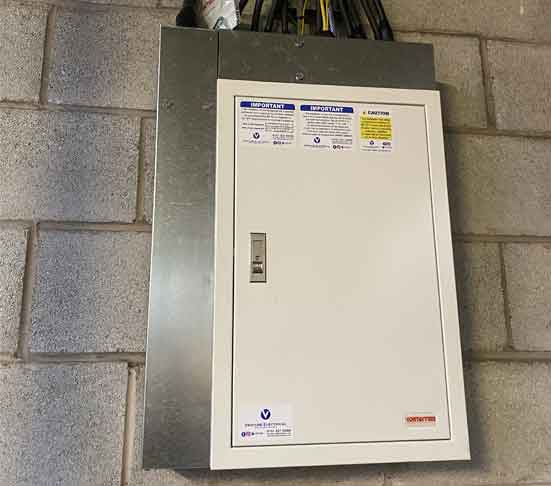
Distribution Board (Fuse Box)
Looking for a reliable electrical service in Liverpool? Look no further than Venture Electrical Ltd! Our team of expert electricians specialize in installing, repairing, and upgrading distribution boards and fuse boxes. We pride ourselves on providing top-quality service at affordable prices. Contact us today for all your electrical needs!
Fuse Box/Consumer Unit Information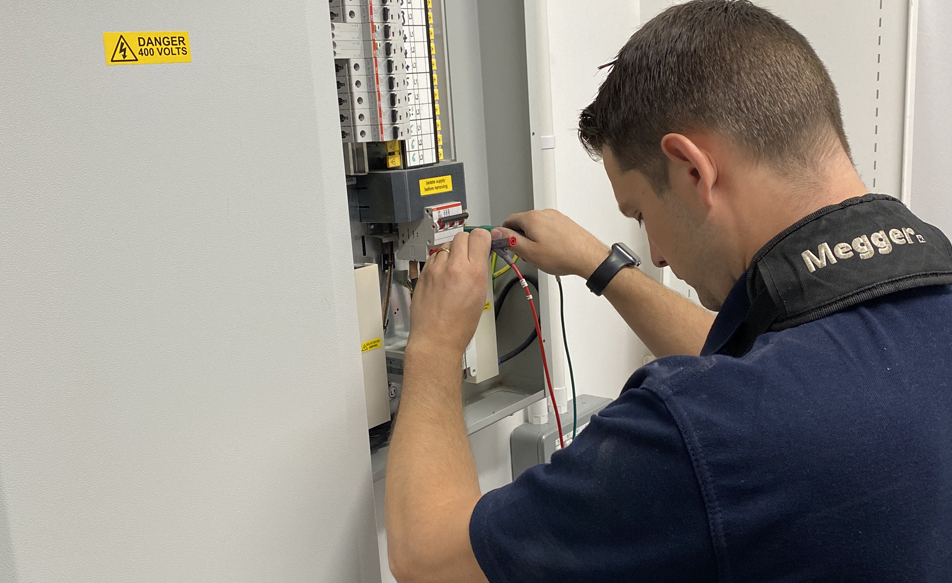
What Is An Electrical Contractor
Welcome to our Liverpool Electrical Contractor Service, your one-stop-shop for all your electrical needs. Our team of certified electricians provide top-quality electrical services for residential, commercial, and industrial properties. From installations to repairs, we offer a range of services to keep your property powered up and running smoothly. Contact us today for a free consultation and estimate!
What does an Electrical contractor do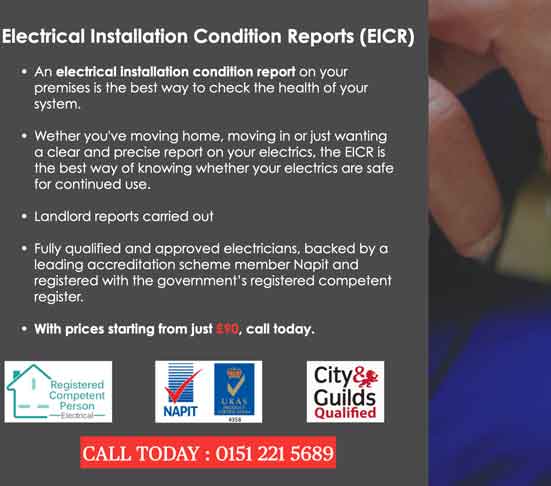
EICR Certificate – Venture Electricians Liverpool
Ensure the safety of your property with our Liverpool Electrical EICR Certificates. Our team of certified electricians conduct thorough inspections of your electrical systems and issue Electrical Installation Condition Reports (EICR) to verify that they are safe and up-to-date with regulations. We provide reliable, efficient, and cost-effective services to keep your property in compliance with industry standards. Contact us today to schedule your inspection!
Electrical Wiring Regulations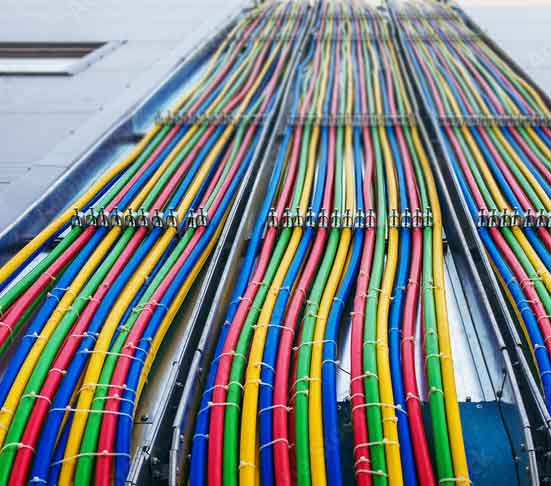
Electrical Wiring
Need electrical wiring services for your home or business? Look no further than our local Domestic and Commercial Electrical Wiring Services. Our team of experienced electricians provide a range of electrical services, from installations to repairs, for both residential and commercial properties. We pride ourselves on delivering top-quality services that meet the highest safety and quality standards. Contact us today to schedule a consultation!
Electrical Wiring Information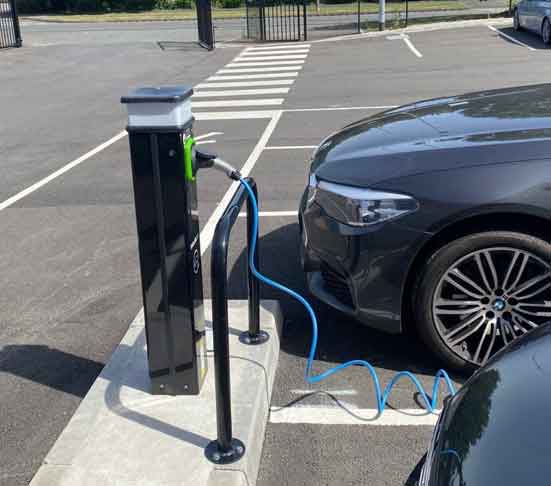
Electric Vehicle Charging Station – Venture Electricians Liverpool
Welcome to our Electric Vehicle Charging Station Services, your go-to destination for all your EV charging needs. Our team of certified electricians specialize in installing and maintaining EV charging stations for both residential and commercial properties. We offer reliable, efficient, and cost-effective services to keep your EV powered up and ready to go. Contact us today to learn more about our services and schedule your installation!
EV Charging Station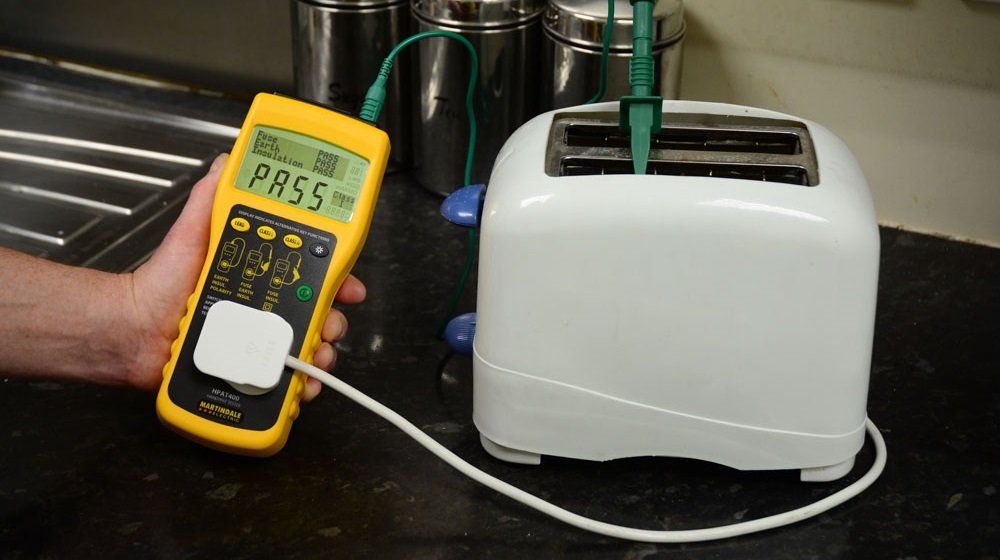
Portable Appliance Testing
Ensure the safety of your electrical appliances with our Electrical Portable Appliance Testing (PAT) service. Our team of certified electricians provide reliable and efficient testing to ensure that your appliances are safe and up-to-date with industry standards. We offer a range of services to both residential and commercial properties, including inspections, testing, and repairs. Contact us today to schedule your PAT service and keep your property safe!
PAT Testing – Venture Electricians Liverpool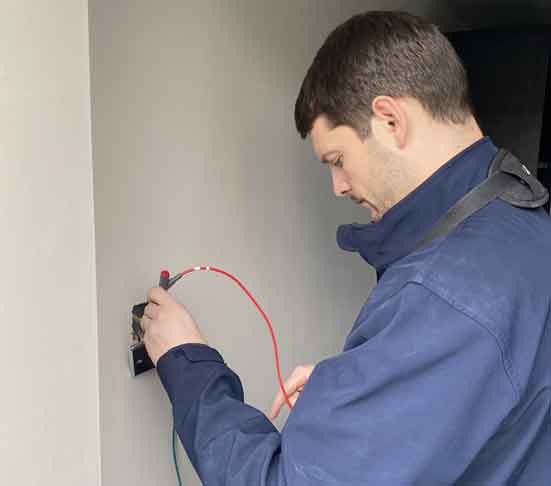
Approved Electrical Fault Finding
Welcome to our Approved Electrical Fault Finding service, where we pride ourselves on being the go-to source for diagnosing and repairing electrical faults. Our team of certified electricians use the latest equipment and techniques to quickly and accurately identify and fix electrical issues. We offer reliable and efficient services to both residential and commercial properties. Contact us today to schedule your fault finding service and get your property back up and running!
Finding Electrical Faults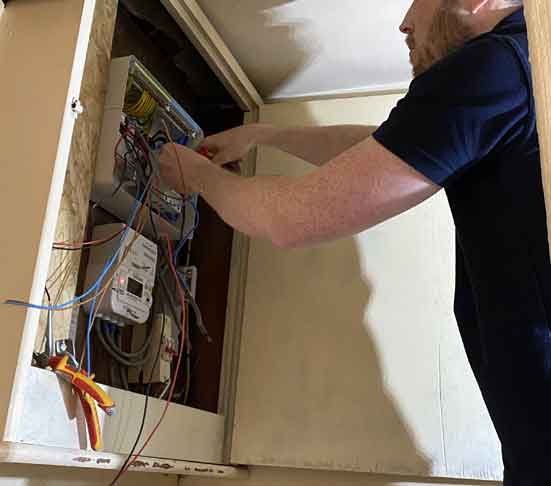
When Does A House Need Rewiring?
At Venture Electrical Ltd we provide approved electrical rewiring services for homes and businesses. Our team of certified electricians specialize in rewiring properties to ensure the safety and functionality of electrical systems. We offer reliable and efficient services at competitive prices, using only the highest quality materials and techniques. Contact us today to schedule a consultation and keep your property safe and up-to-date with industry standards.
House Rewiring – Renewing Electrical Wiring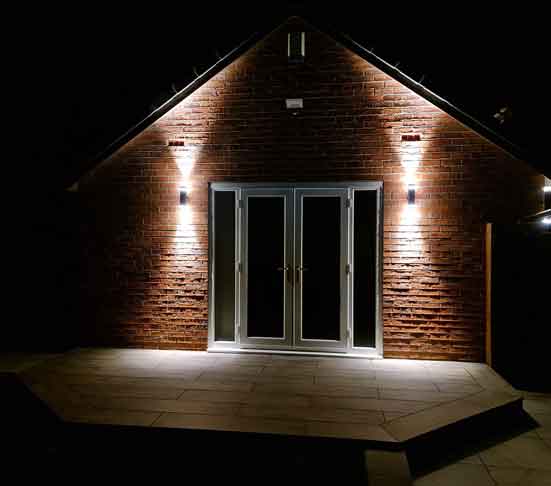
Light Fittings and Fixtures
Welcome to Venture Electrical Ltd's Light Fittings and Fixtures Installation And Repair Service. Our team of certified electricians provide reliable and efficient services for installing and repairing all types of light fixtures and fittings for homes and businesses. We use only the highest quality materials and techniques to ensure that your property is well-lit and functional. Contact us today to schedule your installation or repair service and brighten up your space!
Install Light fixtures and Light Fittings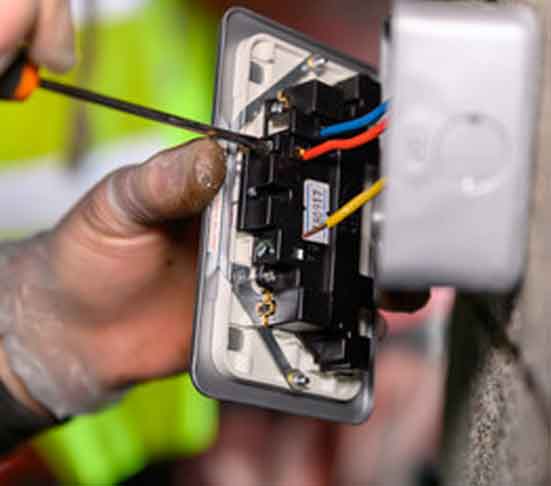
Installing And Replacing Outlet Sockets and Switches
Looking to install or replace outlet sockets and switches in your home or business? Our team of certified electricians provide reliable and efficient services for Installing And Replacing Outlet Sockets and Switches. We offer a range of services to keep your electrical systems up-to-date and functioning properly. Contact us today to schedule your installation or replacement service and keep your property powered up!
Plug Sockets and Light Switches